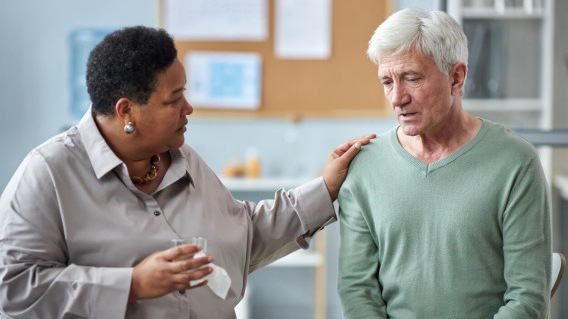World Mental Health Day: A Personal and Professional Perspective
Health & WellnessWritten by Dana Nolan, MS, LMHC | Edited By Amy Edel

Mesothelioma survivors and caregivers commonly prioritize treating the disease and managing physical symptoms. As a psychotherapist working for several decades in oncology, I’ve seen first hand that it’s essential to address the mental health effects as well.
The World Health Organization’s World Mental Health Day on October 10 is an opportunity to raise awareness about the importance of mental health care. This year’s theme is “Mental Health is a Human Right.” WHO’s aim is to promote the right to access quality and affordable mental health care for all.
Mesothelioma survivors often experience anxiety, depression and sleep problems. Mental health care improves quality of life for survivors and caregivers.
Patient Then Counselor in Cancer Treatment Centers
When I was diagnosed with a rare pediatric cancer in 1988, I received my care at a state-of-the-art cancer treatment center affiliated with a university’s research facility. I received great medical care and remain cancer-free. But no one ever asked how I was doing emotionally or screened me for anxiety symptoms (which I certainly had a lot of!).
My health care providers were kind to me as a young adult with cancer. But there were no mental health care providers there to help me with my mental health issues at that time.
After I became a mental health professional, I worked for more than 15 years with cancer patients and their families in cancer research facilities or in comprehensive cancer treatment centers. Fortunately, the cancer patients I worked with had access to free counseling from counselors with expertise in psycho-oncology.
It was wonderful to be able to work with cancer patients, providing them with emotional support and mental health care without them having to worry about insurance copays or other out of pocket costs.
I’m honored to currently co-facilitate The Mesothelioma Center’s monthly support group, which provides a safe place for mesothelioma patients and caregivers. They can connect with others, gain support and share mesothelioma resources and tips.
In the decades since my diagnosis and treatment, great strides have been made in the research of mental health needs of cancer patients. Progress has also been made in the development of standards of psychosocial care for cancer patients.
Research and Standards of Mental Health Care
The U.S. National Institute of Health annual Institute of Medicine report in 2008 focused on the psychosocial needs of cancer patients. The report also outlined standards of care for cancer treatment providers to address their patients’ mental health.
The report noted: “All cancer care should ensure the provision of appropriate psychosocial health services.” It called for:
- “Facilitating effective communication between patients and care providers.
- Identifying each patient’s psychosocial health needs.
- Designing and implementing a plan that links the patient with needed psychosocial services, coordinates biomedical and psychosocial care and engages and supports patients in managing their illness and health.
- Systematically following up on, re-evaluating and adjusting plans.”
The American College of Surgeons’ Commission on Cancer responded to the IOM recommendations in 2009. By 2015, commission-accredited cancer programs were required to establish a screening method for all cancer patients for emotional distress.
Cancer programs were also required to provide psychosocial care or link patients with psychosocial services. These recommendations and standards of care are an important step in ensuring cancer patients’ mental health needs are met.
Mental Health Care for Mesothelioma Patients
Many of the major cancer treatment centers that specialize in mesothelioma care are American College of Surgeons-accredited. They now provide screening and treatment for mental health issues and emotional distress to their cancer patients.
More cancer treatment centers are recognizing the need for holistic comprehensive care. Many programs are beginning to include spiritual care, mental health care, dietary counseling and complementary therapies in addition to medical, surgical and radiation oncology.
Access to oncology-informed mental health care in rural or remote areas, however, can still be limited. Mental health care resources vary greatly from place to place.
Fortunately, virtual counseling is becoming more widespread. Insurance companies are also more open to reimbursement for virtual mental health care than they were before COVID.
On this World Mental Health Day, take a moment to reflect on the advances in meeting the mental health needs of mesothelioma sufferers. We still have work to do to make sure that all mesothelioma survivors and their loved ones have access to quality mental health support, but we have certainly come a long way!




